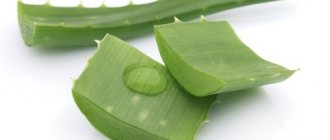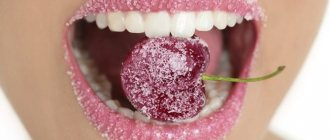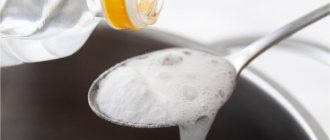April 24, 2019
Does the salty taste in your mouth and on your lips or tongue have anything to do with what you recently ate? So it’s time to read the article prepared by the editors of the UltraSmile.ru portal. Keep in mind that the problem can be caused by very unpleasant and even dangerous processes occurring in the body. Details below.
A salty taste in the mouth can be caused by many factors.
Reason #1: poor oral hygiene
If you don't clean your teeth and gums well enough or completely ignore your daily care routine, plaque will begin to accumulate on your teeth. Initially, it is soft in consistency, but under the influence of salts from saliva it mineralizes and hardens. Such plaque is an excellent “base” for the proliferation of pathogenic bacteria; it cannot be cleaned without the help of a dentist and professional hygiene procedures. Bacterial waste products and mineralized, hardened plaque contribute to the sensation of a salty taste on the lips and in the mouth.
The development of bacteria on teeth can cause saltiness
Reason #2: bleeding gums
There is a taste of salt and you don’t know what could be causing it? The cause of this phenomenon could be bleeding gums. It could arise against the background of trauma to the mucous membrane or as a result of the development of gingivitis or periodontitis.
Blood is close in its ionic composition to sea water. It contains sodium and chloride ions, due to which people with a similar pathology experience a salty taste.
Your mouth may also feel salty due to the fact that you recently had a tooth removed. After all, after this procedure, a wound has formed, which first bleeds, and then ichor is released from it for a long time. Damaged tissues need time to heal, after which the unpleasant symptom will no longer bother you.
Inflammation and bleeding of the gums causes this problem.
Diagnostics
Making a correct diagnosis based solely on the manifestation of such a symptom is impossible even for the most experienced gastroenterologist. For this reason, diagnostic measures will be comprehensive and include:
FGDS procedure
- studying the medical history and life history of the patient - this is necessary to identify the factors of occurrence, since not all of them may be pathological;
- a thorough physical examination;
- detailed survey – to assess the entire clinical picture;
- clinical and biochemical studies of urine and blood;
- Ultrasound and radiography;
- FGDS and biopsy;
- other examination methods prescribed on an individual basis.
Reason No. 3: abuse of salty foods
Why are your lips salty and your mouth taste like salt? The most common reason is that you ate salty food. Remember that salt in large quantities is harmful to the body, it negatively affects the cardiovascular system, kidneys and liver, stomach, retains fluid in the tissues, and at the same time contributes to poor absorption of calcium, which is so beneficial for our teeth and bones. Salt accelerates the aging of the body and impairs the functioning of blood vessels.
As an alternative to this product, scientists advise adding healthy and safe natural substitutes to your food - celery, herbs and seasonings, garlic, dried seaweed. To preserve the salts found in natural foods, it is recommended to steam them rather than fry or boil them.
Excessive salt intake can leave a taste on the lips and tongue
A scientist from Maine actually proposed an alternative way to salt food - special cutlery that, touching the tongue, produces impulses. Thanks to this, a person has the feeling that he has eaten rich food. Scientists at the University of Tokyo have also developed a three-mode electric plug that can imitate the taste of salt. Such a fork was tested in one of the restaurants in Tokyo, where visitors were offered to eat completely lean cutlets with its help. After using such devices, the same taste of salt appears in the mouth and on the lips.
Reason #4: Dehydration
If you have a salty taste in your mouth, then it’s time to calculate how much clean water you drink per day. Because it is the imbalance of fluid in the body that often becomes the answer to the question of why the salty taste bothers us. Our saliva contains sodium chloride, in other words, it is ordinary salt. When fluid is lost in the body, blood and saliva thicken, causing dry mouth. Saliva undergoes a process of dehydration, causing it to contain more salt and less liquid and other useful minerals. The more severe the dehydration, the more clearly the unpleasant symptom appears.
The cause of dehydration could be a low-carbohydrate diet, taking diuretics, poisoning and indigestion, drinking alcoholic beverages, drinking too much strong coffee or soda, or smoking a large number of cigarettes. Dehydration can develop during intense physical activity, after spending a long time in the scorching sun or in hot, stuffy rooms.
An imbalance of fluid in the body often causes a bothersome salty taste.
When dehydrated, the taste of salt may be accompanied by other alarming symptoms: weakness, dizziness, thirst, rare urination, diarrhea. The first thing to do in such a condition is to drink as much liquid as possible, in particular clean water. It’s better to generally make it a rule to drink at least one and a half or two liters of water a day every day. This is approximately 8 glasses. However, in cases where the body suffers from dehydration, this figure can be safely increased. For example, lovers of strong coffee drinks who drink up to 5 mugs of coffee a day should regulate the balance of healthy fluids in the body by taking 2-3 glasses of clean water more than those who are not fond of coffee.
Treatment options
You should know! To eliminate the soapy taste, you will need to cure the cause of the distortion in taste perception.
If the sensation disorder was caused by the poor quality of products and cosmetics, it is necessary to stop further use of them.
The diet and care products
should With the development of a pathological process due to diseases of the gastrointestinal tract, comprehensive treatment is necessary :
- Drug therapy. Drugs should be prescribed by the attending physician depending on the diagnosis, condition and individual characteristics of the patient’s body. A specialist will help you adjust the daily dosage of the medication and the duration of the course. Symptomatic treatment is carried out, aimed at eliminating signs of the disease.
- Diet therapy. During indigestion, you should not create additional stress on your organs.
- Carrying out surgical intervention when conservative treatment methods are low.
Know! Pregnant women are advised to neutralize the unpleasant taste by rinsing the mouth with herbal infusions daily.
They will not help normalize hormonal levels or replenish vitamins.
Therefore, you should consult a gynecologist and change your daily diet.
If there is a deficiency of nutrients in the body, you can take multivitamin complexes .
Folk recipes
To rinse your mouth, you can use the following recipes:
- Mix 1 tbsp. l. dried chamomile and sage. The dry collection needs to be poured with 500 ml of boiling water and left to simmer in a water bath for 40 minutes. After this time, you need to let the broth cool, after which you need to strain the liquid and rinse 100 ml after each meal .
- Make a mixture of dry eucalyptus and calendula flowers , taken in equal proportions. Plants need to be filled with hot water in a ratio of 1:2 . After this, cook over low heat for half an hour. You need to rinse your mouth with a warm solution 3-4 times a day.
- Dill water should be added to the soda solution. To prepare the latter you need 0.5 tsp. dissolve soda in a glass of water. You need to rinse your mouth with the product in the morning, after waking up.
Traditional medicine can only be used with the permission of the attending physician.
Herbal components may weaken the effect of drugs, increase the risk of side effects, or cause an allergic reaction.
If the cause of the pathological process is the use of old dentures, they should be replaced .
After purchasing a new product, the soapy taste should stop. Otherwise, you need to undergo a dental examination to prevent the development of infection.
After treatment, you should maintain oral hygiene.
Reference! In some cases, the cause of the development of an unpleasant taste is the abuse of fatty foods. In such a situation, animal fat acts as soap on the tongue.
To eliminate discomfort, you must follow a diet . You will need to exclude the following foods from your diet:
- fatty. fried, smoked, pickled and spicy foods;
- preservatives;
- sausages, lard;
- alcoholic, carbonated and sweet drinks.
You need to prepare cereal porridges, eat lean beef and poultry, and fish fillets. It is recommended to steam, grill, oven or boil dishes in water.
Avoid eating large amounts of sour fruits and dairy products . You are allowed to drink kefir, eat greens and vegetables.
Such food will help normalize the peristalsis of intestinal smooth muscles and increase the number of bifidobacteria and lactobacilli in the body.
Reason #5: taking certain medications
The feeling of salt in the mouth and lips appears when using hormonal drugs, antihistamines, antidepressants and diuretics. The problem is often typical for people who are being treated for cancer with chemotherapy. If the constant taste of salt is associated specifically with taking certain medications, then when they are discontinued, it will disappear without a trace. If the pills need to be taken on an ongoing basis, then why not visit your doctor so that he can select a different drug? This way you can get rid of the problem.
Reason #6: ENT diseases
The salty taste sometimes has rather trivial causes: for example, bacterial sinusitis, allergic rhinitis, tonsillitis, pharyngitis, sinusitis or a cold. During inflammation, mucus appears in the sinuses, which consists of mucin protein, salt, nucleic acids and water. In the acute course of the disease, snot flows down the walls of the nasopharynx into the throat, and accordingly, a feeling of salt occurs. With sluggish inflammation of the ENT organs, mucus is also constantly disturbing by its appearance in the mouth.
ENT diseases also contribute to the appearance of a salty taste
Other symptoms
Note! When a soapy taste is caused by any disease, the symptomatic picture is not limited to disruption of the papillary receptors on the tongue.
In addition to the existing symptoms, the pathological process is characterized by the appearance of the following factors:
- heartburn, sour belching, increased acidity of gastric juice;
- nausea, frequent vomiting;
- in case of digestive disorders, stool disturbances are observed: constipation or diarrhea;
- dry cough;
- muscle weakness;
- chronic fatigue;
- pain in the epigastric region;
- increased body temperature;
- bitterness in the mouth after waking up;
- headache, dizziness;
- decreased performance;
- drowsiness or insomnia.
Keep in mind! Depending on the cause of the appearance of a specific taste on the tongue, the clinical picture of the disease may be supplemented by other symptoms.
Neurological disorders are complemented by a decrease in cognitive functions, loss of spatial orientation, memory deterioration and loss of coordination.
Reason #7: dysfunction of the salivary glands
A specific taste of salt appears in the mouth as a result of the development of various diseases that damage the functionality of the salivary glands:
- Sjögren's syndrome: is an autoimmune systemic disorder of connective tissue. The disease mainly affects the lacrimal and salivary glands. The pathology can develop against the background of rheumatoid arthritis or lupus erythematosus,
- xerostomia: a condition characterized by dry mouth, which explains the presence of a salty taste in the mouth. This pathology can develop in those who take antihistamines or antidepressants, suffer from hypertension and diabetes. The disease also occurs in people who have undergone radiation therapy in the head and neck area. However, according to some studies, xerostomia most often occurs in older people. Between 10 and 60% of older people worldwide suffer from dry mouth. Moreover, the disease most often affects women1.
The culprit may be salivary stone disease, which is caused by blockage of the salivary glands. You can read about it in more detail in a separate article on the website, specially prepared by journalists from the portal’s editorial office.
Dry mouth causes a specific taste
The salty taste that occurs against the background of xerostomia is not dangerous in itself. But the diseases that caused it are dangerous, as well as the unpleasant consequences of dry mucous membranes. The fact is that saliva is a protector of the oral cavity from bacterial attack. Saliva also washes away food particles and helps us soften food. But if there is not enough of it, then difficulties with swallowing food and stomach problems inevitably arise, as well as dental problems. A person with xerostomia has a high risk of rapid development of oral dysbiosis, caries, pulpitis, periodontitis, gingivitis, and stomatitis. Also, when the mucous membrane is dry, a persistent bad breath occurs.
Possible complications
The symptom itself does not cause complications, but diseases that manifest themselves in this way can.
The most common causes and their complications :
- Plaque – caries;
- Periodontal inflammation – osteomyelitis of the jaw;
- Injuries and inflammations of the mucous membrane, inflammation of the pharynx - abscess;
- Sinusitis – spread of purulent focus, sepsis;
- Mumps – abscess of the salivary gland, inflammation of other exocrine glands;
- Inflammation of the lacrimal canal – spread of inflammation, conjunctivitis;
- Dehydration – increased dehydration, arrhythmia, death;
- Kidney pathologies – renal failure;
- Allergy – anaphylactic shock;
- Hormonal disorders – increased hormonal disorders;
- Gastritis and ulcers - perforation of the ulcer, rough scars, narrowing of the pylorus;
- Diabetes mellitus – pathologies of blood vessels, retina, kidneys.
Most of them do not develop instantly - the patient and doctor have time to notice alarming symptoms and take action in time. These conditions are life-threatening when left untreated or treated incorrectly.
Causes and treatment of unpleasant taste in the mouth:
Why does the problem occur in women?
Taste of salt in my mouth. What does it mean? Most often, the phenomenon occurs in women, for example, before menstruation or during pregnancy. Saltiness in the mouth may be due to dehydration as a result of toxicosis. Another reason is dysgeusia. This is a disease in which taste disturbance occurs. During pregnancy, under the influence of hormones, such a condition occurs often and is temporary - after delivery everything goes away without a trace.
Pregnancy often causes toxicosis
The fair half of humanity may have salt on their lips and mouth due to frequent mood swings and emotionality. The reason for its appearance is tears. However, tears can become a frequent companion not only for women, but also for everyone else if there are more serious health problems: allergies, eye diseases, photophobia.
In older women, the taste of salt on the lips and mouth occurs due to menopause. The phenomenon is often accompanied by dry mucous membranes, the inability to swallow hard or large pieces of food, itching and burning.
Associated symptoms and what they indicate
By looking at various accompanying symptoms, you can understand what is happening to the body and how serious it is. It should be remembered that self-diagnosis does not provide a comprehensive result - its task is to determine how urgently you need to see a doctor, or whether the problem can be solved on your own. In any case, in emergency conditions, an unpleasant taste is the last thing the patient pays attention to.
If this symptom worries the patient, it means there is time for self-diagnosis.
| Symptom | What is he talking about? |
| The taste is constant | This situation occurs when there are problems in the oral cavity or neighboring organs, and the process is chronic. The constant flow of blood, mucus, tear fluid or pus creates unpleasant sensations. The same situation occurs with abuse of salty foods, alcohol and dehydration. |
| Taste appears in the morning after eating | This is due to the characteristics of the products. Smoked meats and pickles for breakfast create a lasting aftertaste for a long time. Coffee or strong tea can have the same effect due to dehydration. |
| Taste in the morning | This may be a reaction to dental care products. More serious causes are stomach pathologies that cause reflux of contents, belching, and heartburn. In this case, the symptom appears in the early morning when the patient wakes up. |
| Salty saliva | This symptom is observed with dehydration, excess salty foods, pathologies of the salivary glands, kidney diseases, and diabetes. |
| The taste of salt on my lips | Associated with inflammation, damage to the lip mucosa, excessive sweating, allergies, and lacrimation. |
| Salty teeth feeling | Occurs when hygiene standards are violated - this is the taste of mineralized plaque. |
| Sweet-salty taste | Appears with dehydration, pregnancy, chronic inflammatory processes, and sometimes bleeding. Often not related to the sugar content of substances that enter saliva. |
| Bitter salty taste | Occurs with pathologies of the salivary glands, pyloric diseases, gastritis, gastric ulcers, kidney diseases, diabetes, poisoning. |
| Sour-salty taste | Associated with GERD, damage to the esophagus, poor hygiene, and dehydration. |
| Food seems salty | This effect occurs with a combination of dehydration and insufficiently moist food, and mental illness. |
| A cough appears | A sign of an inflammatory process in the throat, severe dehydration (cough when swallowing). |
Taking medications can cause any shade of salty taste - this is an individual reaction. If the discomfort is very disturbing, or other symptoms appear, you should consult a doctor - you may need to find another remedy or change the dosage.
Why does the problem occur in men?
There is a salty taste in my mouth. What is it and why does it occur in men? This phenomenon often occurs in athletes or people engaged in exhausting physical labor. During physical overload or training, blood pressure rises and blood flows stronger. And as we have already found out, the blood contains sodium, chloride and iron ions. This explains why, after physical labor or active sports, a person has salty lips and a feeling of salt in the mouth.
Don't abuse alcohol
In the morning after a stormy party or get-togethers with friends, you wonder why there is a taste of salt in your mouth? The reason may lie in alcohol abuse. Don't forget that alcoholic drinks have a strong dehydrating effect. An excess of alcohol in the blood causes intoxication and dehydration of the body. To restore the balance of fluids and beneficial minerals in the body, be sure to drink plenty of distilled water and mineral water in the following days.
What can you say about children?
If a child feels the taste of salt in his mouth and lips, then the reasons can be completely different. This may be due to poor oral hygiene, dehydration, or internal diseases of the body. Here, to identify the problem, you need to observe the baby. If the phenomenon is permanent, then it is necessary to contact a pediatrician and show the child to a dentist. Doctors will examine the little patient, conduct a series of studies, and issue a referral for tests. If you have a constant taste of salt in your mouth, adults should also be examined by a therapist and dentist.
Notice
: Undefined variable: post_id in
/home/c/ch75405/public_html/wp-content/themes/UltraSmile/single-item.php
on line
45 Notice
: Undefined variable: full in
/home/c/ch75405/public_html/wp-content /themes/UltraSmile/single-item.php
on line
46
Rate this article:
( 24 ratings, average: 4.50 out of 5)
prevention
- I.M. Makeeva, V.Yu. Doroshina, M.G. Arakelyan. Xerostomia and remedies that alleviate its manifestations. Dentistry. 2013;92(5): 12-13
Comments
Which doctor should you visit first if you constantly have a salty taste in your mouth?
Agata (05/16/2019 at 07:44 pm) Reply to comment
- Dear Agatha! First you need to visit a dentist and an ENT doctor. You need to take a biochemical blood test and take pictures of the paranasal sinuses. If these doctors have not identified any problems, then be sure to go to a therapist, who will prescribe tests for other diseases.
Editorial staff of the portal UltraSmile.ru (05/20/2019 at 09:18) Reply to comment
Have you found the reason for the taste of salt in my mouth? I’ve been going to all the doctors for 2 months, no one knows
Julia (05.05.2021 at 18:05) Reply to comment
Did you happen to take the drug remantodine?
Ruslan (11/20/2021 at 01:30) Reply to comment
Write your comment Cancel reply
Treatment depending on the identified cause
Treatment depends entirely on what is causing the salty taste in your mouth. There is no point in fighting the symptom - it will constantly return. Moreover, such actions are dangerous, since the pathological process continues if it is not stopped.
If the cause is tartar, the dentist will prescribe its removal or professional cleaning. This is not only a way to whiten your teeth, but also solve hygiene problems. It is recommended to repeat this procedure only at certain intervals, and it does not replace proper dental care. If the problem is something else, then appropriate means are used.
Medicines (tablets, ointments, solutions, injections)
Etiotropic ones are used, i.e.
affecting the cause, and pathogenetic agents that stop the pathological process. Medicines for the actual salty taste in the mouth are not used - this is impractical. Antibiotics are prescribed if there is a bacterial infection and the causative agent is identified. Used for sinusitis, inflammatory processes in the oral cavity, mumps, inflammation of the lacrimal canal.
Dosage forms:
- Local – dental ointments, solutions for rinsing the mouth and throat, eye drops, nasal drops;
- Tablets - used when there is a high risk of complications and spread of infection;
- Injections - most often inside the sinuses. In severe cases, intramuscular or intravenous administration of antibiotics.
The same rule applies to all antimicrobial and antifungal agents - the course of treatment should be at least 5 and no more than 10 days . Broad-spectrum agents are usually prescribed.
Antihistamines (antiallergic) drugs are prescribed for allergies . Depending on the type of irritant, medications can be taken in advance before contact with the allergen, in courses during a dangerous period, or urgently when symptoms appear.
In case of hormonal imbalances, medications are prescribed that return hormonal levels to normal. Selecting an appropriate treatment regimen will take time, since the body's reaction is individual.
Anti-inflammatory drugs are classified as pathogenetic. They are prescribed for bacterial, fungal and viral infections, allergic reactions . Their task is to stop the pathological process. Effective in combination with etiotropic drugs. The forms of administration are varied - these are dental ointments, rinses, throat sprays, eye drops, nasal drops, oral powders, tablets, etc.
For chronic diseases, medications are prescribed to slow down the pathological process. The complete list of medications can be very extensive and depends on the course of the disease in a particular patient. Among the chronic diseases manifested by a salty taste are diabetes mellitus, gastritis and peptic ulcers, GERD, and chronic renal failure. Their treatment regimens are completely different.
In case of early stage dehydration, the patient is recommended to normalize the drinking regime. To normalize fluid metabolism, rehydron is prescribed - a drug with electrolytes in powder form. It is advisable to drink mineral water, limit tea and coffee. If these measures do not help and the pathological process develops, hospitalization and intravenous fluid administration are required.
Folk recipes
These are symptomatic remedies that will help temporarily get rid of the problem, but will not help cure it.
Traditional medicine recommends various herbal rinses that will restore normal sense of taste. Among the popular recipes:
- Chamomile;
- Sage;
- Eucalyptus;
- Oak bark;
- Calendula.
It is recommended to rinse your mouth with an infusion of these plants (separately or in a mixture) every 2-3 hours. Doctors do not recommend combining traditional methods with treatment with sprays and dental ointments - this reduces the effectiveness of the drugs. Traditional rinses are useful for patients with chronic diseases, for whom the salty taste is not the main, but unpleasant symptom. In pregnant women, unless a more serious cause is identified, the use of rinses will also be effective.
Diet
It is necessary to exclude from the diet foods that significantly increase the secretion of salt and increase the amount of fluid.
Authorized products:
- Fruits and vegetables – up to 50% of the diet;
- Cereals;
- Coarse bread;
- Meat – chicken or turkey;
- Lean fish;
- For sweets – dried fruits, walnuts, honey (if there is no inflammation in the oral cavity);
- Milk;
- Mineral water;
- Fruit and vegetable juices;
- Compotes, jelly, infusions;
- Vegetable oil.
It is permissible to prepare food in any way, except for salting, marinating and smoking, the main thing is to observe the measure in adding salt. The list of prohibited foods includes salted and pickled vegetables, smoked meats, canned food, sausages, most cheeses, any salty foods, alcohol, tea and coffee. Other products are added as desired, but in small quantities.
If the patient suffers from chronic diseases and has already been prescribed a diet, then the menu is selected based on all the recommendations. The right diet is not decisive in getting rid of an unpleasant symptom if it is not caused by the abuse of salt and alcohol.










